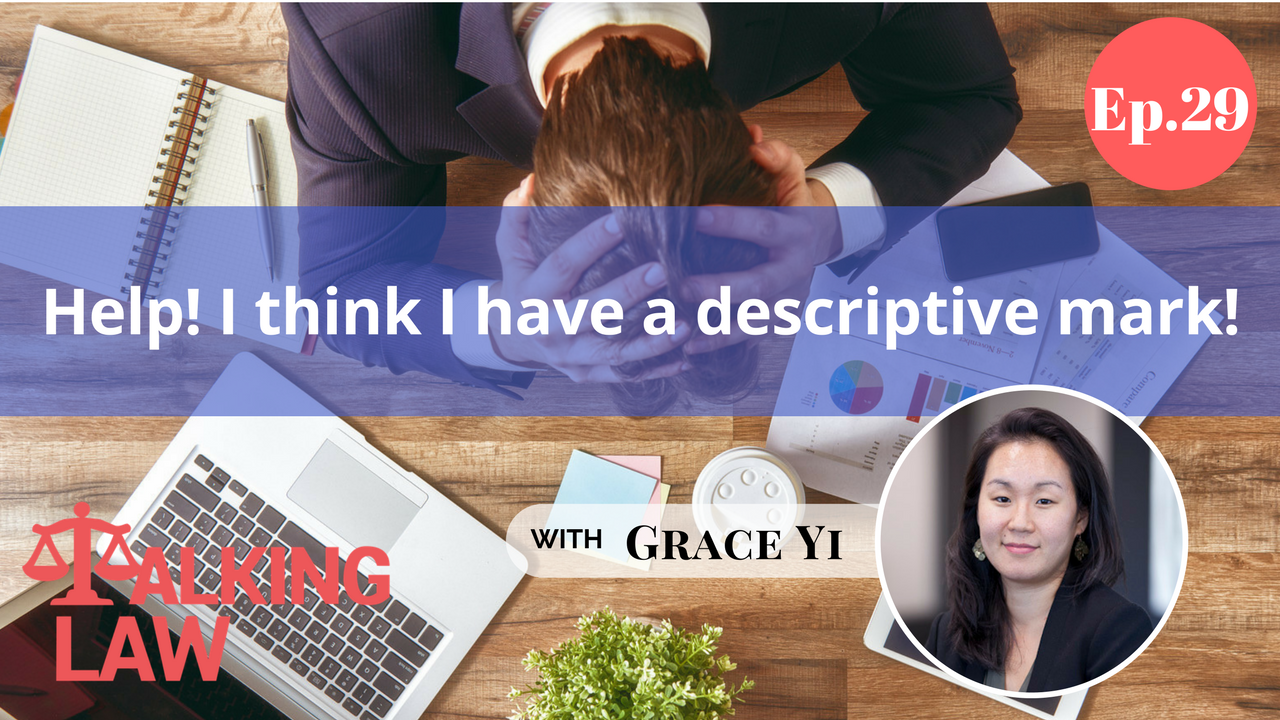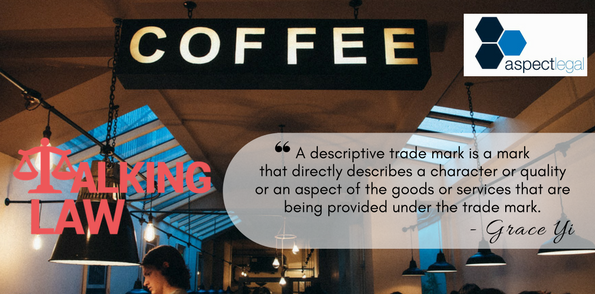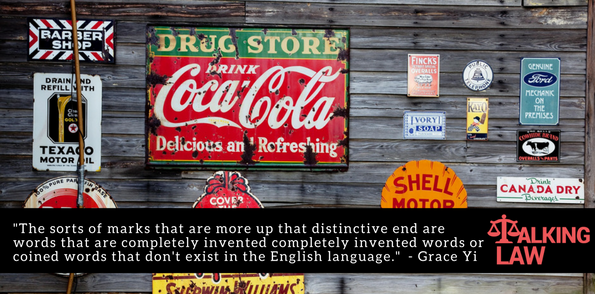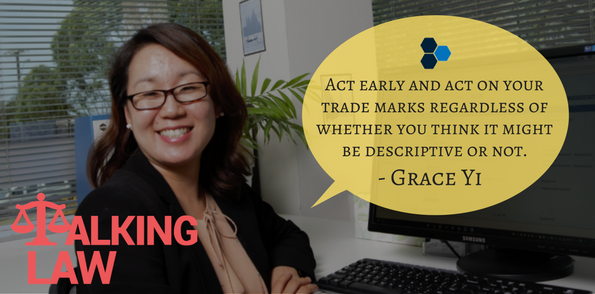
In this episode, we discuss issues relating to descriptive trade marks. We are also giving out our Trade mark Information Pack if you’re interested in finding out how trade mark registration might work for you.

Episode Highlights:
01:42 What is a descriptive mark?
02:50 Marketing versus legal approach
05:10 Issues with a descriptive mark
08:10 What to do if you have a descriptive trade mark
11:23 benefits of registration
13:30 Quick recap
Joanna: Hi, it’s Joanna Oakey here and welcome back to Talking Law! Today we are talking about the area of trade marks, and in particular how to deal with a descriptive trade mark because this is an issue that comes up time and time again. Of course, I have brought along our resident expert Grace Yi, who heads up our IP and Trade marks Division, to talk to us today about what to do if we think we have a descriptive trade mark. Hi Grace, welcome aboard!
Grace: Hi Jo, nice to be here!
Joanna: Perfect. Let’s start off with what a descriptive trade mark is. Maybe you can just give a little bit of an overview for people who don’t have a lot of background in trade marks and may not understand exactly what we’re talking about when we say a descriptive trade mark.
What is a descriptive mark?
Grace: Yeah. I think we might have touched on this on one of our earlier podcast but it’s good to talk about it in some more detail. Essentially, a descriptive trade mark is a mark that directly describes a character or quality or an aspect of the goods or services that are being provided under the trade mark.
With trade marks, for them to be “registrable” as a trade mark and for the Trade marks Office to accept it for registration, the trade mark has to be sufficiently distinctive. We have a concept of all trade marks falling somewhere on a spectrum, where on one end the trade mark is highly generic or descriptive and on the other end they’re highly unique and distinctive. What we want is for the trade mark to be up the distinctive end. I thought it would be good today to talk about what actually makes a trade mark distinctive as opposed to descriptive and then just talk about ways that you can make them more distinctive.
Marketing versus legal approach
Joanna: I think it’s a really important point because what happens out there often, when people come up with a brand for a new business or a new good or service that they are delivering, is they often come up with something that they feel will be readily understood and recognized by the market in relation to what they’re providing. And the issue with this is we have this tension between a marketing approach versus a legal approach in terms of what you can actually protect down the line. We really see this play out in practice when people have got words as part of their business or company name or as part of their product name that are entirely generic or descriptive of what it is that they do. And that’s where this issue comes in, right?
Grace: Yes absolutely. And I totally understand. Even recently I was speaking to a client about this exact issue and I explained to him the sorts of things that make a trade mark really unique and of course one of the examples that comes up over and over again are the marks like Apple or Coca-cola. Both of those are very, very strong, distinctive marks because they have nothing to do with the service or the product that is provided under the mark.
Joanna: Or words like Google.
Grace: That’s right. All these made up words that have no meaning in the English language, in the case of Google and Coca-cola. But with Apple it’s distinctive because it has nothing to do with computers. But the point that the client was making was “Well, I understand that. But those companies have huge budgets for marketing and they can educate the market as to what they’re providing.” And I guess that’s the reason why a lot of start-up companies or businesses choose marks that are more on the descriptive end, because they don’t have a concept of the tools that you can use to try and help words that still convey something and explain what you’re doing but in a roundabout way, in a way that still makes the mark distinctive. I think this is really useful for anyone who is at that brand creation stage.
Issues with a descriptive mark
Joanna: Yeah. Let’s make it clear why there are issues in any event with a descriptive mark. Number one, if your mark is highly descriptive then the Trade marks Office is going to say “We’re not going to give you protection because trade mark protection provides monopoly right protection essentially. We’re not going to put you in the position where you can tell other traders not to use words that are generic and descriptive of the market that they would generally maybe want to use in conversation that relates to the market or the industry without intending to infringe your right.” That’s the one area.

And then another area is completely aside from the whole trade marks area in terms of what the Trade marks Office will or won’t accept is the concept of enforceability. How is it that you can stop a company from using a mark if that mark is highly descriptive? And the answer is it can be quite difficult. But as you said earlier this is all about a spectrum. Obviously there’s some marks that are extremely highly descriptive but there are some that are in that spectrum between descriptive and distinctive that where we can probably work on them to a degree to get them across the line. But always, what we say to our customers is “Let’s work through first why it is that you want a trade mark registration in the first place and let’s make sure we’re getting the right protection then that meets up with your requirements from that protection.”
Maybe if you can talk a little bit more about what we should do if we already have the descriptive trade mark that we’re using in relation to our company or the goods and services.
Grace: Yeah. If you’re at that early stage where you’ve just come up with a name and you haven’t actually started using the mark yet. We’re talking about a business now who is actually at that start-up stage and thinking about a brand. And you’ve come to us and if we pick up on this as being an issue, we’ll talk to you about what you might be able to do if after having spoken to you about the inherent problems with a mark that’s more descriptive. It might be that we suggest you tweak something in your mark. The sorts of marks that are more up that distinctive end are words that are completely invented completely invented words or coined words that don’t exist in the English language. They’re really, really distinctive marks. Words like Adidas where it’s a portmanteau or a combination of somebody’s initials and somebody’s surname — that can be very distinctive. And a word like Skype which is a conjoined word meaning “sky peer-to-peer” is very distinctive. These sorts of marks are immediately protectable and highly distinctive. If something like that works for you, then you might want to take up that sort of idea or approach for your brand.
What to do if you have a descriptive trade mark
Joanna: But what you’re talking about here is if an organisation has the opportunity to rebrand, then this is what we might be looking at in terms of how we would be rebranding our mark. This is for organisations who are either right at the initial phase of branding a new product or service or have had major issues because later on down the line they’ve realised that their highly descriptive mark isn’t working for them because they can’t keep out the competitors and they’re finding it really hard to differentiate themselves from their competitors. They’re needing to rebrand and certainly we see a lot of that. Obviously, it’s best to make the right decisions right at the outset.
Let’s talk then about organisations that already have a descriptive mark. Let’s say not highly descriptive, but a mark that sort of is sitting there in the grey area of somewhat descriptive and not highly distinctive but something that they’ve built up a lot of goodwill under. I think that’s a really good example of many types of clients who come to us. They have had issues getting protection and used other lawyers who aren’t experts in the area. Then they come to us to try and get those marks registered, we talk about what the benefit is still of them registering a mark even though they’ve got a mark that is somewhat descriptive.
Grace: Yes, I think you hit the nail on the head there. The concept here of distinctiveness and descriptiveness is very grey. Even though you might think “Oh, my trade mark got some descriptive elements in it,” it’s best to come and get it checked out. We’ve had lots of cases where we’ve been successful in getting words contained in the mark registered as a trade mark based on submissions to the Trade marks Office where we argue and put our arguments forward as to why we believe the trade mark is sufficiently distinctive. Based on those sorts of submissions where we really do have to go back to quoting lots of case law (and there is a lot of case law discussion because it’s a grey area and courts have to come in and make decisions) and some help make some helpful guidelines as to what sorts of marks are sufficiently distinctive and how the examination should be done.

We can make those sorts of submissions and we have been successful in getting trade marks over the line which can make all the difference between having an unregistered trade mark and a registered trade mark. And the real benefit here is that when it comes to the enforcement situation when you’re wanting to use your trade mark rights, having the rest of trade mark when you’re dealing with a mark that might be considered to be descriptive can make all the difference.
And again, we’ve had lots of successful situations where using a trade mark registration for a mark that might have been considered to be descriptive at the beginning. We’ve been able to get a competitor to just immediately stop using a similar trade mark and infringe on our client’s trade mark rights.
Joanna: Absolutely.
Grace: It’s really important.
Benefits of registration
Joanna: And that’s what it’s about at the end of the day, isn’t it? If you have spent a lot of time building up that reputation under a mark and you feel it’s got sufficient value that you want to continue using it even though it’s somewhat descriptive but you’ve noticed that there’s competitors out in the marketplace that are using a similar mark, having a trade mark registration gives us that ability to make such a stronger move on the competitor than if we didn’t have a registered trade mark. At the end of the day, that’s the biggest advantage to having a trade mark registration — the ease with which it provides you the ability to take action against competitors who are using similar marks, as opposed to the harder position that you would be in without that registered trade mark to take action to stop people from using the mark.
Grace: Absolutely. And it can work both ways because it’s also providing you with that protection. If somebody else comes to you and says that they’ve got issues with your use of the mark, having it registered gives you that protection against that sort of situation as well.
Joanna: As a defensive measure. Absolutely. The other thing that we should really talk about in terms of the registration benefits in this situation is that registration itself can help create the situation where you’re preventing other similar marks from getting onto the register (i.e. you’re preventing other people from getting trade mark registrations.) That’s a really critical element.
We’ve had lots of clients that have been dealing with other lawyers before us and then come to us and unfortunately been in the situation where for whatever reason they’ve missed the ability to get on the trade marks register as quickly as possible and other competitors have gotten them first. It’s a really unfortunate situation because trade mark registration really is that “first in best dressed” type of situation.
Grace: Absolutely. Yep, so act early and act on your trade marks regardless of whether you think it might be descriptive or not.
Quick Recap
Joanna: Great. I think that’s a really good outline of the benefits of looking at protection of a descriptive trade mark and what to do if you have a descriptive trade mark. Just as a quick recap, in this episode we talked about:
- descriptive trade marks — what are they
- what makes a trade mark descriptive versus distinctive
- the issue with a descriptive trade mark
- what to do if you have a descriptive trade mark
So the action steps moving forward if you have a descriptive trade mark is if you’re in the early stage of use, then maybe you might have the opportunity to tweak or change it and we can certainly help provide pointers about the tweaks and changes that may make all the difference at the end of the day.
Or alternatively, if you’re at a later stage of use and you’ve really start to build up some goodwill under that mark but you just want to get that protection to try and stop other traders from using marks that are too similar, then you have the opportunity to get a trade mark registration. Maybe not for the mark in and of itself. But maybe for elements of the mark or elements of the mark combined with other elements. But in any event, getting a registration can make all the difference.
If you would like more information about this topic head over to our website at talkinglaw.com.au. Through that website you’ll be able to get a transcript of this podcast episode, if you’d like to read it in more detail and you’ll also be able to get a Trade mark Information Pack if you’re interested in finding out how trade mark registration might work for you.
There you can also find details of how to contact our lawyers at Aspect Legal if you’d like help with any of the items we covered today. And finally, if you enjoyed what you heard today please pop over to iTunes and leave us a review.
Thanks for coming along Grace and sharing all of your trade mark knowledge once again.
Grace: It was my pleasure Jo.
Joanna: Great. All right. And thanks to you for listening in. You’ve been listening to talking law. See you next time.

















